
Try entering a couple words, like “pregnancy help” or “food for toddlers”.

Welcome! Ready to Give Your Child a Strong, Healthy and Happy Start?
Parenting is a tough job, and so much information is available, it can be confusing. The NJ WIC program provides this feature of reliable facts and helpful resources as your “go to” place for parenting info. WIC encourages families to value everyone’s role as members of your child’s “parenting team”. Moms and dads need the love, support, and strength that grandparents, family, and friends provide... AND everyone needs to respect the special role parents have to “set limits”.
Parents do more than care for a child’s physical needs. Families guide children to develop social, spiritual, and learning skills from infancy to adulthood. Your family’s parenting style will evolve as you support your child’s independence to meet their age, and unique personal qualities. Ready to start building skills your family needs now? Return to this page for new skills as your family experiences parenting challenges during the pre-school years.
Select a topic below:

Parents need skills to protect and care for their child’s health and safety. Your skills will also help your child grow into a productive adult who has learned the value of family and friends. To begin, most parents want skills that help their child feel:
Moms know they begin to protect their child long before their baby is born.
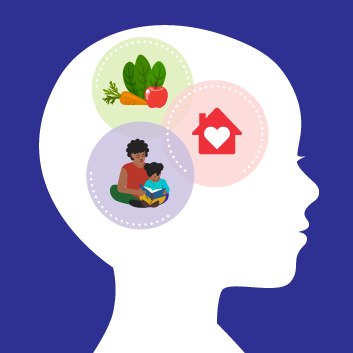
The foods that moms eat while pregnant, and the foods they feed to their infants and toddlers provide the nutrients that build:
Kids also need their families to respond to their needs and provide a safe nurturing home environment.
Why build your parenting skills before your baby is born?
Take care of yourself, so you can take care of your family.
Pregnancy is the perfect time to think ahead about what you need to be a strong, competent, and capable parent. Ready to build your confidence and inner strength?
Try this sample Postpartum Plan Worksheet. Use it to help plan to build your support system for life with a newborn.
Asking for Help is Powerful
A thought from author,
Brené Brown, PhD, MSW
“Offering help is courageous and compassionate, but so is asking for help.”
If you are a person that feels good about being a helper, and have avoided asking for help, try the following tips to feel more comfortable to ask for help.
Be clear, specific, positive, and grateful. If you are concerned about “losing control,” share your desire for “a small amount of help, or assistance”. Now imagine offering help to someone with a question like, “Is there something I can do to help you?” The key is listening and if able, respond by agreeing to their request. Be careful to be respectful. If you want to offer something more, or different, request their permission, avoid surprises. If you are unavailable and want to help in the future, be sure to say so. Do you feel better about asking for help?
How to Prepare for Difficult Conversations and Difficult People (if needed)
Many people avoid hard conversations with people we love because we feel uncomfortable. The bad news is when we avoid dealing with a small situation, things could get worse.
Tips to start difficult conversations:

Resources to Understand Your Child’s Growth and Development
Infancy to Age 5
Developmental Milestones are skills such as taking a first step, smiling for the first time and waving “bye bye” that most children can do by a certain age. Children reach milestones in how they play, learn, speak, act, and move from infancy until age 5.
Tracking milestones helps parents worry less.
Learn more. Find checklists or take a lesson.
Back to Top
From
her book, Becoming
“To be a good parent, you
need to take care of yourself so that you can have the physical and emotional energy to take care of your family.”
As a woman you know your body better than anyone, and often can tell when “something does not feel right”. The Hear Her campaign materials below are potentially life-saving messages about “Urgent Maternal Warning Signs.” Don’t be too busy to be your own best friend during your pregnancy and for one year after delivery.
Be especially aware and proactive to:

Be aware of how you are feeling. Seek medical care right away if you experience any of the signs or symptoms.
Use the resources to stay aware of “urgent maternal warning signs” and share the links with people that support you. Include partners, friends, family, co-workers, and providers.
Encourage everyone who supports you to listen when you tell them “something doesn’t feel right.”
More About Mental/Emotional Health...
Did you know?

Back to Top
What is “The Fourth Trimester”?

The first year begins with “The Fourth Trimester” or the first three months of a baby’s life and the first three months of life as the parent of an infant.
Stay In Touch with Your Feelings!

If you feel an inner voice that says, “something does not feel right,” don”t ignore it. Moms, anticipate the “baby blues” is a common experience for 85% of women. That means moms expect to feel exhausted, overwhelmed, and sad within a few days of giving birth. The intensity of these feelings usually fades after 3 – 5 days.
However, if you feel like you cannot care for your baby or feel sad for more than 2 weeks, you may have postpartum depression. Feeling hopeless or empty after childbirth is not a regular or expected part of being a new mother. Follow your instincts and talk to your doctor if you have concerns.
The first year of transition continues until your baby’s first birthday.
New parents face challenges that impact the whole family.
Stay aware of positive and negative feelings, and how often you talk about how you feel.
Self-care will help you be your best self. Make time for things that make you feel strong, optimistic, and ready to communicate openly.
Back to Top
Infant Feeding
It is normal to have questions about infant feeding.
WIC supports families, regardless of the feeding method you choose. Your key to successful infant feeding is obtaining the necessary education and support that WIC can provide. Know your options, whether through human milk or formula, you can overcome challenges and be prepared for any crisis you may face. Learn from the stories real moms share:

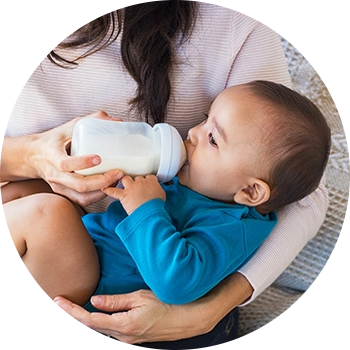
Check out The Secret Ingredient blogs to learn about other family’s WIC experiences:
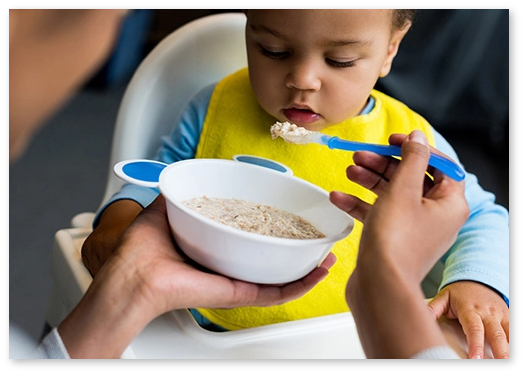
How to introduce solid food
Feeding little ones can be overwhelming for new parents. More than half of parents are confused about what to feed their young child. The foods you select helps your baby grow, nourishes their brain development, and builds a healthy immune system. That’s why making veggies a part of every day is worth the effort. Ready to build your confidence about what, when, and how to feed infants and toddlers?
Important Steps to Safely Introduce Peanut Butter
Research suggests trying peanut butter as a baby may help prevent a peanut allergy later in life. This can be especially important for families with food or egg-related allergies, like eczema or other skin issues. Talk with your baby’s doctor about introducing peanut butter if your family has one of these conditions.
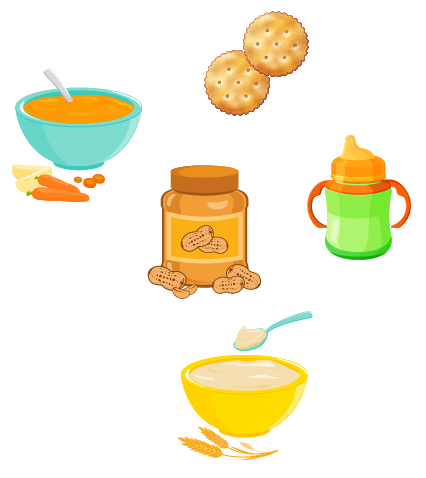
Introduce your baby to peanut butter around 6 months of age, after they have tried other solid foods. Watch your baby for any reaction for two hours after they try it.
Mix peanut butter with water, formula, human milk, or food:
All babies are different. Talk with WIC or your baby’s healthcare provider about your baby’s needs.
Back to Top
Food Habits Start Early: Infants Need a Variety of Veggies
Moms begin to introduce their child to flavors of foods during pregnancy and breastfeeding. When moms consume a variety of veggies, the flavors are passed on to their child through the amniotic fluid and breastmilk. Moms can make it easier for their baby to recognize the veggie flavors when they are old enough to taste solid foods.
Introducing a variety of flavors early is important for your baby to learn different flavors and textures, and to receive a variety of nutrients. You may start with puree or mashed and introduce thicker and lumpier veggies when your child is ready.
Ready to start this project? Use this worksheet to track introducing your infant to a variety of veggies.

What Face Does Your Baby Make When Trying These Veggies?
How to Help Your Kids Learn to Make Decisions
Talking with your kids can help them learn to make decisions. Offer very young children the opportunity to select between two easy choices.

Three examples include:
When your child decides, let them know they made a good decision. Challenge older children with more than two choices and more important decisions. Remember most children and adults make decisions that make them feel good.

Help Your Kids Learn to Handle Their Feelings
The role of parents and caregivers includes:
Encourage your child to learn, understand, and express emotions. Speak simply in language your child can understand.
Help Your Child Eat When Hungry and Stop When Full
If we listen to our body, it tells us when we are hungry and when we are full.
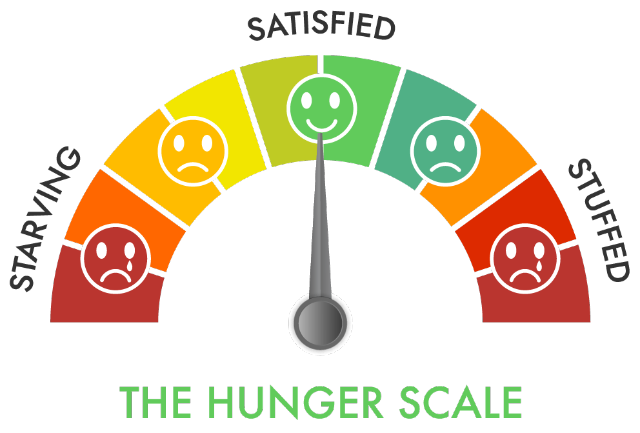
Your Habits Matter
Serve as a role model of a healthy eating style. Be aware of your own eating habits. Do you:
Back to Top
WIC is not just for babies!
WIC food benefits and eating tips help you give your children a great start for a healthy life.
Parents of preschoolers have a unique opportunity! Continue to help your child to try new foods, grow more independent, and practice habits that are fun and healthy.
Help NJ WIC Help You
Let WIC Know What Is Important to You
When your WIC nutritionist asks if you have any questions or concerns about mealtime or a health topic. Try this worksheet as a reminder to prepare for your appointment.
Participants often ask:
TIP: Prepare for WIC and medical appointments with a written list of the questions and concerns you want to discuss during your appointment.

“I don’t know what I would have done without the food benefits that WIC provided. Today my daughter is 13 years old. I have an amazing career. I purchased my own home, all by myself as a single mom.”
The goal of WIC is to help you and your children to eat better, grow better and make your WIC experience the best that it can be.
WIC gives more than just food. We give your family the gift of being healthy eaters for life.
Reminder WIC eligibility is different for women than it is for children. Women are eligible:
Either way, WIC looks forward to helping your family until your child’s 5th birthday.
— Your Friends at NJ WIC

“My husband is attending college, and while we’re tightening our budget, the food we receive from WIC is the help we need to keep on our feet. I’m grateful for the valuable benefit WIC provides to my family of five through this transition in life. Sometimes a little bit can go a long way.”
Your Support System: Great Parents Know When to Ask for Help
Ask WIC for a Referral
WIC can connect your family to services that WIC does not provide. Learn about childcare providers,
community services, specialists, counselors, and healthcare providers your family may need to be healthy.
Your local WIC office knows your local community best. Learn more about
Family Leave Insurance,
Connecting NJ,
Home Visiting Programs, and
other NJ programs your family may be eligible for.
Learn more.

Nourish Your Family, Don’t Just Feed Them!
It is important to have enough healthy food.

“WIC connected me to resources like childcare and Medicaid. The extra support allowed me to finish high school and get an associate degree in child development.”
WIC Can Support Parents Without a Support System—Just Ask!
Contact WIC between appointments if you have questions. WIC provides healthy food, a nutritionist’s support, and guidance on how to shop for, prepare, and enjoy healthy meals. WIC is only a phone call or email away. If WIC cannot help you, WIC can help you find someone who will.
Check out Getting Organized and the Info Hub for more info.
Back to Top
Infant Feeding Stories
It is normal to have questions about infant feeding. Four families share their stories how WIC can help families find the answers that work for them. WIC provides breastfeeding support to help families reach their breastfeeding goals. WIC supports all families that face infant feeding challenges.
How to Introduce Solid Foods
Watch all eight short videos in the series that answers questions about how to know if your baby is ready to start eating foods, what first foods to offer, and what to expect, watch these videos from 1,000 Days.
Build Your Parenting Skills
Essentials for Parenting Toddlers and Preschoolers gives you ways to interact positively with your child. Learn how to handle common parenting challenges with positive parenting skills. Five topics include: communication, creating structure and rules, giving directions, using discipline and consequences, and using time-out. Available in English and Spanish. Video length: 3 to 4 minutes.
Back to Top
For Moms
Emotional Health Resources: Find help for your family to cope with the common emotional health concerns that pregnant and postpartum women and dads experience.
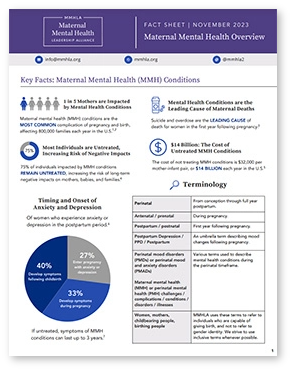
Maternal Mental Health Overview
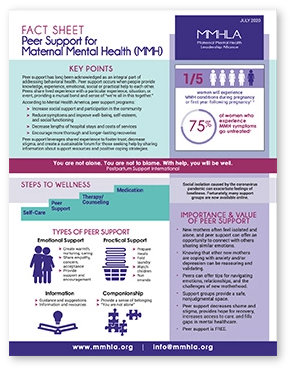
Peer Support for Maternal Mental Health
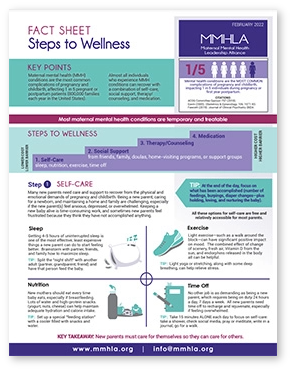
Steps to Wellness
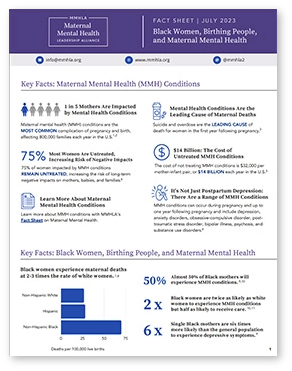
Black Women, Birthing People, and Maternal Mental Health
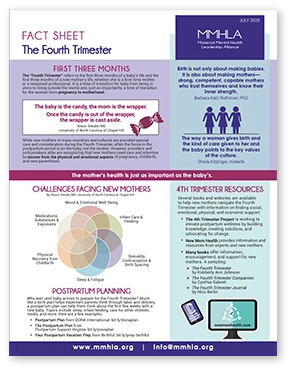
The Fourth Trimester
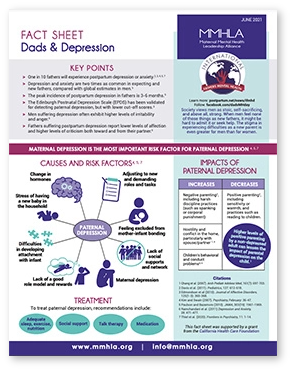
Dads and Depression
Source: Fact Sheets — Maternal Mental Health Leadership Alliance: MMHLA
For Infants
Check out The Secret Ingredients blogs to learn about other family’s WIC experiences.
Other languages: Arabic, Creole, Polish, Portuguese, Bengali
How to Prepare Infant Formula
Hunger and Fullness Cues
Understand how infants communicate when they are hungry and full.
Other languages: Arabic, Creole, Polish, Portuguese, Bengali
For Families
Worksheets
Back to Top